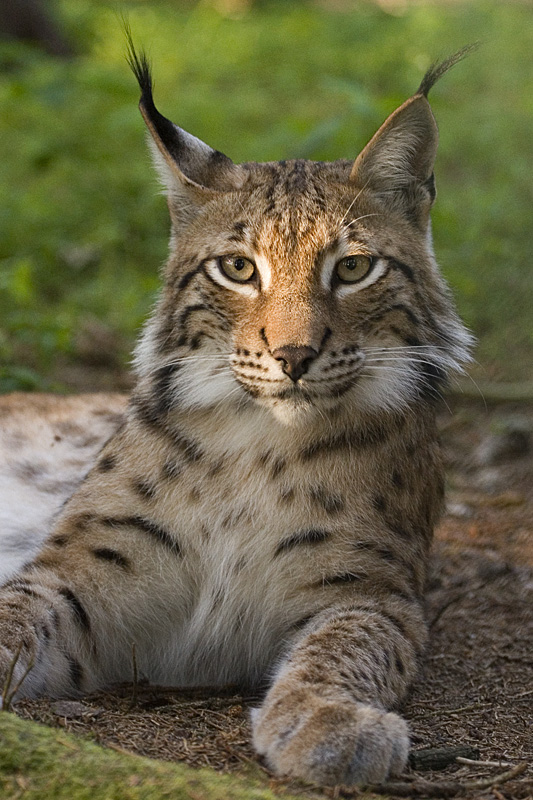As interesting and varied as British wildlife is today, it is nothing to what it once was. Wild areas of the UK used to be home to several key big predators, the bear, the wolf and our subject for today, the Eurasian Lynx. The lynx, along with these other predators, died out a thousand years ago. It would be wonderful to support a struggling species and to see a big predator, a beautiful and shy creature, prowl on our lands once again.
I have very recently heard (on the grapevine, so on no account can I confirm the truth of this) that a reintroduction of Eurasian Lynx into Scotland may now actually be on the cards. I have previously explored this subject with fellow coursemates for a group project for one of my MSc modules and, therefore, will be very excited if this reintroduction project becomes a reality! Below I wish to highlight two of the most important reasons behind why the lynx should be reintroduced. It would follow conservation actions suggested by EU law, which governs all of the UK's treatment of wildlife and plants, and it could hugely benefit the struggling woodland of the Scottish Highlands.
Legislation
Under the EU Habitats Directive (1992), countries that are members of the EU must take actions to ensure the protection and promotion of biodiversity in their country, through conservation methods. 'Biodiversity' refers to the variety of animal and plant species on Earth and the range of places (habitats) they live in. Scotland, as a member of the EU, must implement this
legislation. One of the methods for encouraging conservation,
suggested in the Directive, is the reintroduction of previously native species. Therefore, member states are obliged to consider bringing in species that previously lived in their country. The Eurasian Lynx is one of several large carnivorous
mammals to have become extinct in the UK and this means it would be an ideal species to
reintroduce. It would also be easier to reintroduce than other predators as it can easily live along side people, unlike bears or wolves. Also, the Eurasian lynx (latin name: lynx lynx) is listed in the Habitats Directive as one of the many species
that need to be protected.
In Scotland, in accordance with the Habitats
Directive, actions to encourage conservation are covered in the Nature Conservation Act 2004. This act was designed to carry out the aims suggested in the Habitats Directive. This states that the Scottish government has a ‘duty to further the conservation of
biodiversity’. As a result, the reintroduction of the lynx could be key to fulfilling this duty.
Ecology
The reintroduction of a large carnivore would help to rebalance damaged ecosystems in the Highlands. Scotland has suffered from large scale deforestation. There have also been major increases and a spread in woodland deer populations. In some areas, there are especially large numbers of roe deer, which is the lynx’s main source of prey.
These Scottish deer populations are a serious problem. Their grazing habits are very damaging, inflicting harm on forest, agriculture and areas of natural heritage. Due to excessive numbers, the deer no longer suit and work with their environment as they previously did in the past. High densities of roe deer are attracted to areas with young conifer plantations and naturally regenerating woodland. These are the areas most vulnerable to grazing damage. Thicket stage plantations are attractive for sika deer which can lead to negative impacts on the economy of the forestry industry. Young trees are irreversibly damaged by these habits.
The return of a large predator would be effective in lowering these numbers to encourage a return to a balanced ecosystem. It has been shown, that even where the lynx is unable to significantly lower the deer population, the presence of lynx is still beneficial as it ensures changes in the behaviour of the deer. It is likely that the lynx would target the vulnerable areas of forest where the deer focus their grazing. With a large predator nearby, the deer become redistributed more evenly throughout the landscape and the lynx territories then grow to match this behaviour. Overall, continued predation would lead to eventual successful reduction in deer populations.
The remains of the lynx’s prey would also provide food for other species which would ensure other increases in biodiversity.
Reintroducing lynx into Scotland would help the UK act in accordance with law, which it could be argued it is struggling to achieve currently, and it could bring back natural balance to the Highlands. I would love to see British biodiversity restored to its previous glory with all forms of megafauna existing here again, especially gray wolves and lynx. Other European countries are beginning to reintroduce these beautiful animals and I feel it is time the UK should be following that trend, and hopefully it finally will be.
What do you think? It would be great to hear your views!














